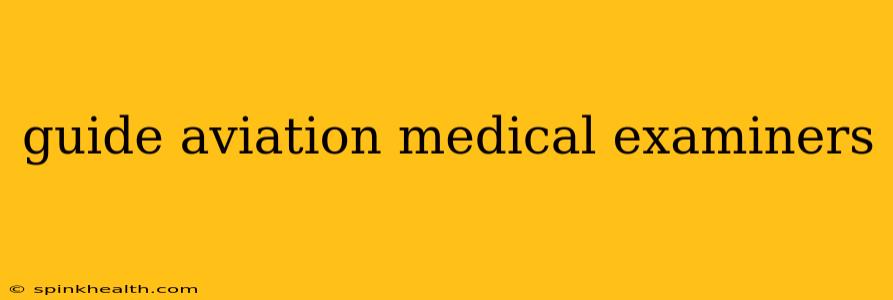A Guide for Aviation Medical Examiners: Navigating the Complexities of Airworthiness
The life of an Aviation Medical Examiner (AME) is a fascinating blend of medical expertise and intricate regulatory knowledge. It's a role demanding not just medical proficiency, but a deep understanding of aviation safety regulations and the unique health challenges faced by pilots and aircrew. This guide delves into the key aspects of being a successful and effective AME, offering insights and addressing common questions.
Think of it like this: you're the gatekeeper, ensuring only individuals meeting stringent health standards take to the skies. Your judgment directly impacts flight safety, making your role critically important.
What are the key responsibilities of an Aviation Medical Examiner?
Your primary responsibility is to conduct thorough medical examinations of pilots, aircrew, and other aviation personnel to determine their fitness to fly. This involves a detailed assessment of their medical history, current health status, and any potential limitations that could affect their ability to perform their duties safely. You're not just looking for diseases; you're assessing overall function and the impact on pilot performance under pressure.
This goes beyond a simple physical. You're looking at:
- Medical History: A comprehensive review of past illnesses, surgeries, medications, and family history of medical conditions.
- Physical Examination: A detailed assessment of the cardiovascular, neurological, ophthalmological, auditory, and musculoskeletal systems. This often includes specialized tests beyond a standard physical.
- Psychosocial Assessment: Evaluation of mental health, including any history of depression, anxiety, or substance abuse.
- Regulatory Compliance: Understanding and adhering to all relevant aviation medical standards and regulations. These vary by country and licensing authority.
- Documentation: Meticulous record-keeping is crucial, ensuring accurate and complete documentation of all examinations and findings.
What medical conditions commonly disqualify pilots?
Many conditions can impact a pilot's ability to fly safely. These often fall under categories impacting vision, cardiovascular health, neurological function, and mental health. Some common examples include:
- Uncontrolled Hypertension: High blood pressure that isn't managed effectively can pose a serious risk.
- Significant Cardiovascular Disease: Conditions like coronary artery disease or heart valve problems can significantly impact flight safety.
- Epilepsy or Seizure Disorders: The risk of an in-flight seizure is obviously unacceptable.
- Untreated Mental Health Conditions: Conditions like severe depression or anxiety can impair judgment and decision-making abilities crucial for safe flight operations.
- Significant Visual Impairments: Vision is paramount for flying. Corrective lenses can often mitigate some issues, but severe impairments are disqualifying.
It’s crucial to remember that these are examples and the specific standards and interpretations vary based on the aviation authority's regulations and the specific details of each case.
How do I stay updated on aviation medical regulations and best practices?
The aviation medical field is constantly evolving. Staying current requires ongoing professional development. This includes:
- Regular Participation in Continuing Medical Education (CME): Focus on courses specifically designed for AMEs.
- Membership in Professional Organizations: Joining relevant aviation medical associations provides access to updates, guidelines, and networking opportunities.
- Reviewing Aviation Medical Publications and Journals: Stay abreast of the latest research and regulatory changes.
- Networking with Other AMEs: Sharing experiences and best practices with colleagues can be invaluable.
What are the ethical considerations for an AME?
Maintaining the highest ethical standards is paramount. Your decisions directly impact the safety of others. This includes:
- Impartiality: Conducting examinations objectively, without bias.
- Confidentiality: Protecting the privacy of examinees’ medical information.
- Transparency: Communicating clearly and honestly with examinees about their fitness to fly.
- Professional Boundaries: Maintaining appropriate professional relationships with examinees.
How can I improve my communication skills as an AME?
Clear and effective communication is essential for building rapport with examinees, explaining complex medical information, and ensuring mutual understanding. This involves active listening, clear explanations in non-technical language, and empathy.
Being an Aviation Medical Examiner is a demanding but profoundly rewarding profession. By understanding the complexities of the role, staying current with regulations, and upholding the highest ethical standards, you play a critical role in ensuring the safety of the skies.

